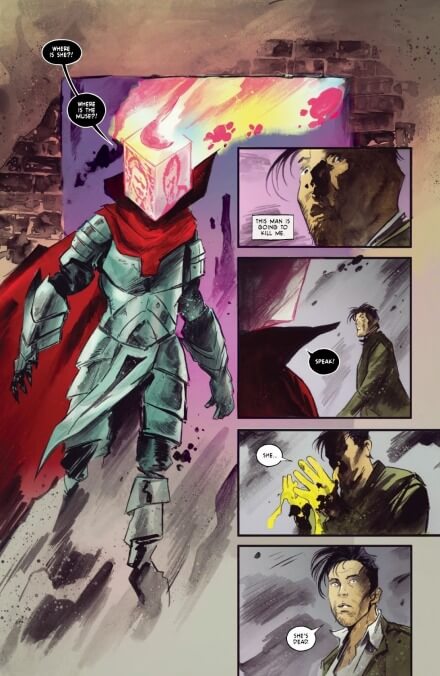A hateful, unreliable narrator turns Fearscape into a cruel, unimaginative work

Unlikable, even downright terrible protagonists aren’t inherently a bad thing, but they do require very careful treatment. Combine an unsympathetic, bad-acting protagonist with an attempt at satire, or an even more ambitious genre meta-commentary, and things get complicated and treacherous very quickly. Unfortunately, Fearscape falls into nearly every trap that it sets up for itself, and doesn’t manage to recover gracefully from the descent.
The book opens with a page that rips into the nine-panel layout. It’s not clear until the second page that this is the protagonist, Henry Henry narrating rather than writer Ryan O’Sullivan digging at a particular fellow creator. The narration is aggressive enough to be immediately off-putting, setting a tone for the rest of the book that doesn’t do it any favors; it’s further hampered by Henry’s penchant for elitist, overly academic diction. It’s too convoluted and opaque to be anything but intentionally alienating.
Henry’s deeply hateful personality informs some incredibly cruel choices that start with stealing his mentor’s work and end with murder. He refuses to take any responsibility for his own actions, working his way through a series of lies while addressing the reader directly at every turn. It’s a constant attempt to excuse his actions, going so far as to visibly erase other people’s words and replace them with his own. Visually, this is handled in interesting ways. Artist Andrea Mutti and letters from Andworld Design do a lot of heavy lifting to make the discrepancies between reality and what Henry wishes were true about himself. Dialogue overlaps and words fly off the page when appropriate, leaving it clear just how unreliable a narrator Henry is, despite his copious claims that he isn’t.
The biggest disappointment of Fearscape is that the core idea is interesting, but the book gets bullied out of its own story by Henry. O’Sullivan has created another dimension where human fears reside, a world where the Hero With A Thousand Faces and human Storytellers fight against the darkness that human imaginations give birth to. That’s a fascinating concept, and the Hero in particular has some key moments that give glimpses into the role that pop culture, books in particular, play in the creation of the Fearscape. Mutti and colorist Vladimir Popov make the most of what little information and space they get for the Fearscape and its inhabitants, rich with character designs that would fit right into the Sandman Universe.
But the momentarily fun parts of Fearscape are destroyed by O’Sullivan’s choices. The only Storytellers mentioned, the only authors deemed worthy of the Fearscape, are all white men, the gatekeepers of classic and “important” literature; this is never addressed. Henry is boringly vindictive and violent as a protagonist. Fearscape is similar enough to The Fiction, Unwritten, and Books Of Magic that if a reader is turned off by Henry’s behavior, there’s an easy replacement. Fearscape is a particularly cruel and unimaginative derivative work, rather than a genre-busting exploration of a trope.
The book becomes particularly cruel when O’Sullivan aims for what feels like a redemption arc in the final pages. He traces the exact same plot as Martin Chatwin from Lev Grossman’s The Magicians, and unfortunately for O’Sullivan, Fearscape lacks any of the supporting characters that make The Magicians work. If the story had been told from another perspective—particularly Jill, who serves as the actual hero and sole female character that survives the book—Fearscape could have recovered. Jill ends up carrying the weight of everyone else’s mistakes and crimes, but she’s in less than a third of the book. By apparently aiming for meta-commentary but missing, O’Sullivan has crafted the Fight Club of comics, something that a sliver of readers will take seriously. The ending offers some hope that Jill might one day get to tell her own story, but O’Sullivan wasted five issues telling us Henry’s first.
